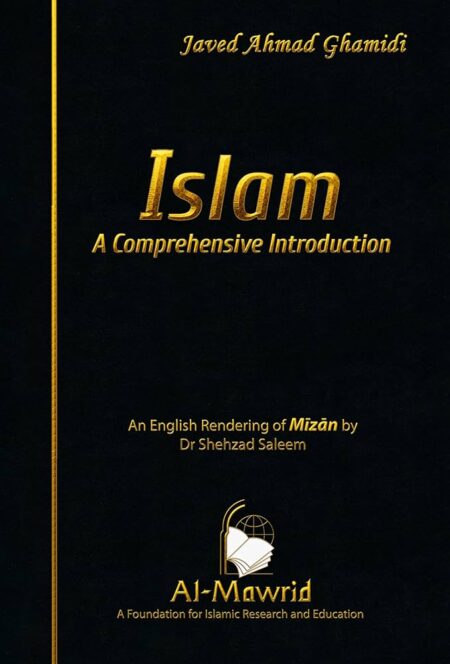Islam A Comprehensive Introduction Javed Ahmad Ghamidi Al Mawrid English
₹750.00 Original price was: ₹750.00.₹600.00Current price is: ₹600.00.
- islam-a-comprehensive-introduction-english
- Tawhid (Monotheism): The belief in the oneness of God is the cornerstone of Islamic theology. Ghamidi explains the concept of Tawhid and its implications for the believer.
- Prophethood: The role of prophets, with a focus on Prophet Muhammad (PBUH), is discussed in detail. Ghamidi emphasizes the continuity of the message brought by all prophets.
- Quran: The Quran as the final revelation is examined, including its compilation, preservation, and interpretation. Ghamidi provides insights into the Quran’s message and its relevance to contemporary issues.
- 2. Worship and Rituals
- Salah (Prayer): The significance of the five daily prayers in a Muslim’s life, along with the proper method and etiquette of performing Salah.
- Zakat (Charity): The concept of charity in Islam, its importance, and the rules governing the distribution of Zakat.
- Sawm (Fasting): The practice of fasting during the month of Ramadan, its spiritual and physical benefits, and the regulations associated with it.
- Hajj (Pilgrimage): The pilgrimage to Mecca, its historical background, and the rituals involved in performing Hajj.

Islam A Comprehensive Introduction Javed Ahmad Ghamidi Al Mawrid English
₹750.00Original price was: ₹750.00.₹600.00Current price is: ₹600.00.Request a Call Back
This contact form is available only for logged in users.
- Delivery & Return
How Does The Delivery Process Work ?
- Once Our System Processes Your Order, Your Products Are Inspected Thoroughly To Ensure They Are In Perfect Condition.
- After They Pass Through The Final Round Of Quality Checks, They Are Packed And Handed Over To Our Trusted Courier Partners.
- Our Delivery Partners Then Bring The Package To You At The Earliest Possibility. In Case, They Are Unable To Reach Your Provided Address Or At A Suitable Time, They Will Contact You To Resolve The Issue.
How Are Items Packed ?
We Package Our Products In Corrugated Boxes, Which Are Covered With 3 Layer Protection. Each Individual Product Is Packed In Bubble Wrap While Fragile Items Like Bottles Are Safely Secured With Additional Bubble Wrap. We Pride Ourselves On The Quality Of Our Packaging.What Is The Range Of Locations To Which Daarul Kitab & Islamic Store Ships It’s Products ?
We Shipped Our Products Pan India!My Order Has Been Shipped, How Can I Track It ?
Once Your Order Has Been Dispatched, You Will Receive An Email And SMS With Tracking Details.You Can Track The Status Of Your Order Within 24 – 48 Hours After Your Order Is Dispatched From Our Warehouse.Following Are Some Of Our Trusted Courier Partners: eKart Logistics, BlueDart, Delhivery, Xpressbees, Ecom Express, DTDC & ShadowfaxWhat Is The Estimated Delivery Time ?
It Takes 3-7 Business Days To Deliver The Order Once Order Has Been Dispatched.Though We Keep 95% Of Our Catalog In Our Inventory, Certain Products Need To Be Sourced Directly From The Brand Itself So That We Can Live Up To Our Promise Of Providing Fresh, Non-expired Products.Are There Any Shipping Charges Applicable To My Order ?
We Have Different Shipping Charges For Different Zones Which Start From 60₹ To 100₹ Is Applied To All Orders Below ₹1999, While There Is Free Shipping For All Orders Above ₹1999Note: Please Take A Video/Photos While Opening A Order You Received We Need It If Anything Goes Wrong With You Order Between Journey Of Our Warehouse To Your Doorstep, If You Find Order Is Damaged Or Intact Please Do Not Accept The Order Delivery .
Disclaimer: Any Complaints Related To Product/Delivery Should Be Brought To Our Notice Within 48 Hours From The Time Of Delivery.
Help
Give us a shout if you have any other questions and/or concerns. Email: support@daarulkitab.com Phone: +918755553311 WhatsApp: +918755553311 - Ask a Question

Islam A Comprehensive Introduction Javed Ahmad Ghamidi Al Mawrid English
₹750.00Original price was: ₹750.00.₹600.00Current price is: ₹600.00.Ask a Question
This contact form is available only for logged in users.
Islam A Comprehensive Introduction Javed Ahmad Ghamidi Al Mawrid English



Islam: A Comprehensive Introduction” by Javed Ahmad Ghamidi, an extensive work published by Al-Mawrid and translated into English.
Overview
“Islam: A Comprehensive Introduction” is an in-depth exploration of Islamic teachings, practices, and theology authored by the renowned Islamic scholar Javed Ahmad Ghamidi. Known for his progressive and rational approach to Islamic scholarship, Ghamidi aims to present a clear and comprehensive understanding of Islam in this work. The book is meticulously structured to cover the fundamental beliefs, rituals, and ethical principles of Islam.
Author Background
Javed Ahmad Ghamidi is a prominent Pakistani Islamic scholar and a former member of the Council of Islamic Ideology. He is well-respected for his efforts to present Islam in a rational and contemporary context. Ghamidi’s work often addresses the challenges faced by Muslims in the modern world, emphasizing the need for a thoughtful and reasoned approach to religious practice.
Content and Structure
The book is organized into several sections, each addressing a specific aspect of Islamic faith and practice:
1. Foundations of Faith
Tawhid (Monotheism): The belief in the oneness of God is the cornerstone of Islamic theology. Ghamidi explains the concept of Tawhid and its implications for the believer.
Prophethood: The role of prophets, with a focus on Prophet Muhammad (PBUH), is discussed in detail. Ghamidi emphasizes the continuity of the message brought by all prophets.
Quran: The Quran as the final revelation is examined, including its compilation, preservation, and interpretation. Ghamidi provides insights into the Quran’s message and its relevance to contemporary issues.
2. Worship and Rituals
Salah (Prayer): The significance of the five daily prayers in a Muslim’s life, along with the proper method and etiquette of performing Salah.
Zakat (Charity): The concept of charity in Islam, its importance, and the rules governing the distribution of Zakat.
Sawm (Fasting): The practice of fasting during the month of Ramadan, its spiritual and physical benefits, and the regulations associated with it.
Hajj (Pilgrimage): The pilgrimage to Mecca, its historical background, and the rituals involved in performing Hajj.
3. Ethics and Morality
Moral Principles: Ghamidi outlines the ethical framework provided by Islam, including the importance of honesty, justice, and compassion.
Social Justice: The book addresses issues of social justice, including the rights of women, minorities, and the poor. Ghamidi advocates for a balanced and fair approach to these issues based on Islamic principles.
Family and Society: The role of the family in Islamic society, the rights and responsibilities of family members, and the importance of maintaining strong family bonds.
4. Islamic Law (Sharia)
Sources of Sharia: Ghamidi explains the primary sources of Islamic law, including the Quran, Hadith, and the consensus of scholars.
Fiqh (Jurisprudence): The principles of Islamic jurisprudence and the process of deriving legal rulings from the primary sources.
Contemporary Issues: The application of Sharia to modern issues, including finance, politics, and personal conduct. Ghamidi emphasizes the need for a dynamic and flexible approach to Islamic law in the modern world.
Key Themes
Rational Understanding of Islam: Ghamidi promotes a rational and evidence-based approach to understanding and practicing Islam. He encourages readers to engage critically with the sources and to seek knowledge.
Inclusivity and Tolerance: The book emphasizes the inclusive and tolerant nature of Islam, advocating for mutual respect and understanding among people of different faiths.
Relevance to Modern Life: Ghamidi addresses the challenges faced by Muslims in the modern world and provides practical guidance on how to navigate these challenges while staying true to Islamic principles.
Audience
“Islam: A Comprehensive Introduction” is suitable for a wide audience, including students, scholars, and anyone interested in gaining a deeper understanding of Islam. It serves as a valuable resource for both Muslims and non-Muslims, providing a balanced and thorough exploration of the faith.
Conclusion
“Islam: A Comprehensive Introduction” by Javed Ahmad Ghamidi is an essential work for anyone seeking to understand the principles and practices of Islam. Ghamidi’s clear and rational approach makes the book accessible to a broad audience, while his comprehensive coverage ensures that readers gain a thorough understanding of the faith.
Related Products
- Dedication to Knowledge: The book emphasizes the importance of dedicating oneself fully to the pursuit of knowledge and the sacrifices that may be required.
- Discipline and Consistency: It highlights the need for discipline and consistency in studying, as well as the importance of regular practice.
- Moral Character: The book stresses the development of a strong moral character, which is essential for a student of Islamic knowledge.
- Teacher-Student Relationship: It explores the relationship between teachers and students, emphasizing mutual respect and the importance of seeking guidance.
- Practical Advice: The book provides practical advice on various aspects of studying, including managing distractions, setting goals, and staying motivated.
- Name: Bhatkal Ke Safarname
- Writer : Mohd Mustaqeem Mohtashim Nadvi
- Publisher: Jamia Islamia
- Language: Urdu

